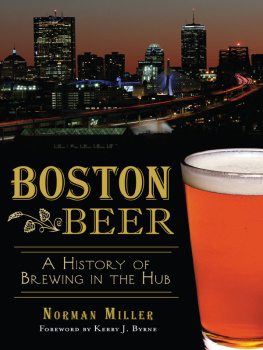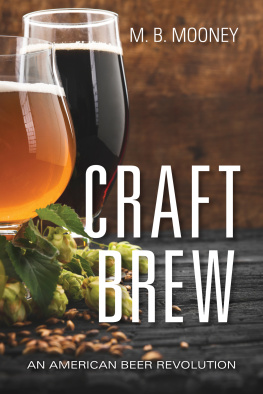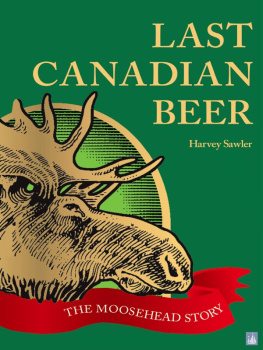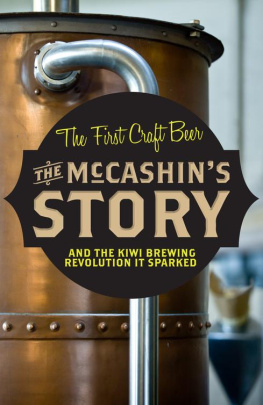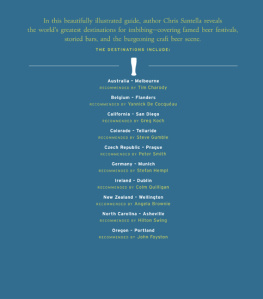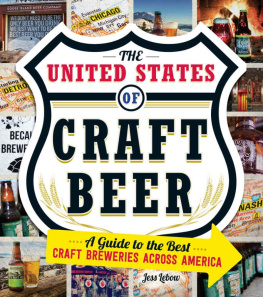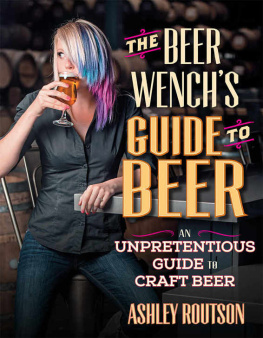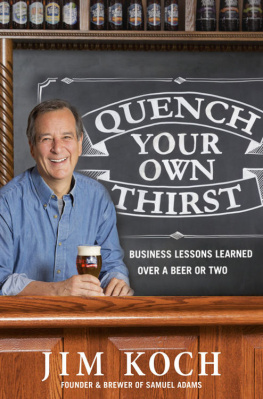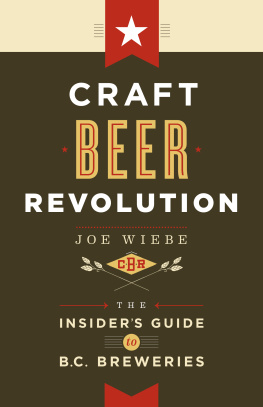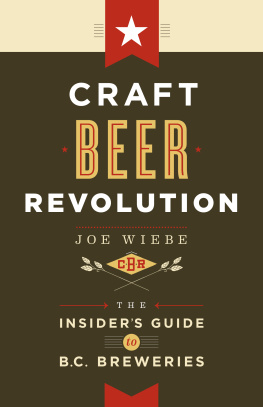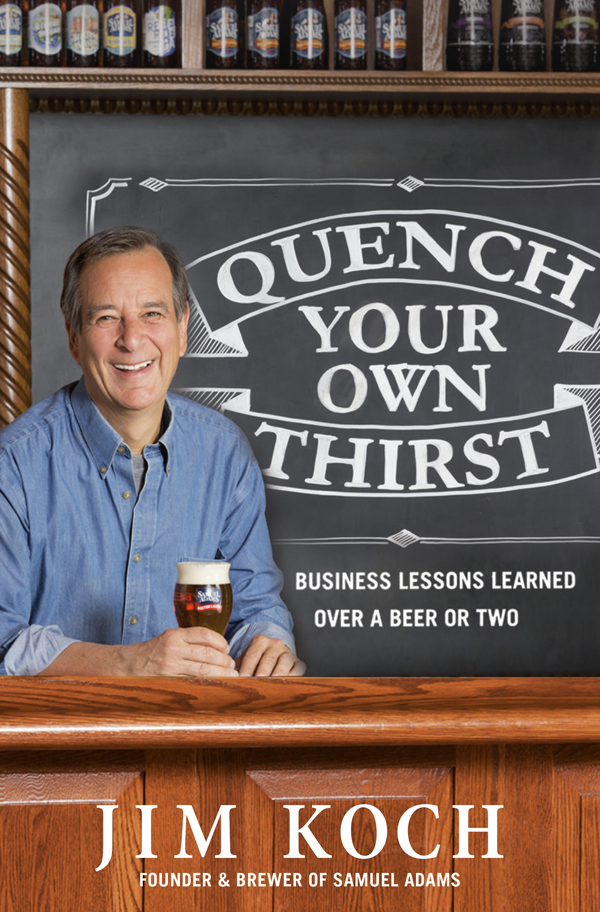Contents
Guide

The author and publisher have provided this e-book to you for your personal use only. You may not make this e-book publicly available in any way. Copyright infringement is against the law. If you believe the copy of this e-book you are reading infringes on the authors copyright, please notify the publisher at: us.macmillanusa.com/piracy.
For Cynthia, sine qua non.
For John, my dear lost friend.
And for my father and mother, my first and best teachers.
From the way my father was looking at me, youd think I had just proposed robbing a bank. A big, ominous-looking bank with gun-toting security guards. Why in the world would you do that ? he asked.
Uh, well
He waved his finger at me. Youll never succeed. The big guys will eat you alive. Theyll grind you up like they did me. He shook his head. Its taken our family a hundred and fifty years to get the smell of the brewery out of our clothes.
We were sitting in my parents kitchen in Cincinnati. Picture a 1950s linoleum floor, Formica counters, and wallpaper depicting culinary dishes in alphabetical order, apple strudel to zucchini bread. It was the spring of 1984, and I had just announced that at the age of thirty-four, I was quitting my job as a management consultant to start a beer company. I figured my dad would be happy. After all, he had been a brewmaster. His father had also been a brewmaster. So had his father. And his father. Five generations of first sons in the Koch family had brewed beer, making us the longest line of brewmasters in the United States. And now, with me, the lineage would continue. What could be better?
I pointed to the business plan I had spread out on the kitchen table. Dad, nobodys doing this the right way. I think Ive got a way to make a go of it. I sketched out my idea to start a small-scale beer company in Boston making high-quality beer for a limited number of drinkers in the region. Im not going to compete with the big boys like Anheuser-Busch. I know theyd kill me. But theres another way. Im going to look for drinkers who appreciate good beer and who would pay a premium for richer, more flavorful beer. Im sure those drinkers exist. If I just focus on making a better beer, I know somebody will drink it.
Dad tapped the table impatiently, although I thought he seemed at least faintly interested now. Are there enough of these drinkers? Can you make a living?
Not the living I currently make, but I can make a living. I pointed at some numbers Id calculated. I think after five years Ill make five thousand barrels a year, with eight employees and $1.2 million in revenue. Thats enough.
Thats not much.
No, but its enough. And Ill be happy. Ill be running my own small brewery.
My father thought about this for a moment. Its not realistic. Brewing today is about sizenothing else. Youre crazy!
Dad, there are a few microbreweries that have started up. In fact, there were about a dozen, mostly on the West Coast. Quality was unpredictable. Cracking open a bottle, you didnt know whether you would get a really great beer or a science project.
How many are making any money? Dad asked.
Probably none.
He laughed. Sounds like a good business. You make beer but no money. How long can you afford to do that?
He was right: There was scant reason to think my venture would be any different. But I was determined to leave my job and start my own business, and brewing was the idea I had come up with that excited me. I wanted to persuade him (and myself) that I wasnt crazy.
We sat there, neither of us speaking. Without warning, he rose to his feet. Jim, follow me.
Where are we going?
Just follow me.
He led me up to the attic. He flicked on a light and began walking toward the back.
Why are we up here?
I want to show you something.
I followed him, taking care not to bump my head. We made our way around boxes and old furniture until we came to a dusty trunk on which he had stacked years of Road & Track and Motor Trend magazines. (Other than his family, Charles J. Koch loved two things: cars and beer.) Here, help me with this. We moved the magazines and cracked open the trunk. Inside were notebooks, folders, and loose paperssome scrawled with handwriting, all yellowed with age. He rifled through papers and held a few up for me to see. This is what is left of the Koch family beer archivesmy course material, my brewing notes. He pulled out a thin folder. And here are the family recipes. Resting the folder on the edge of the trunk, he opened it and read for a few minutes in silence. Then he let out a little hoot as he shook a piece of paper hed found. This is the best beer recipe our family has! Its oldfrom the 1860s. If youre going to do this crazy thing, you might as well start with the best recipe.
He handed me the paper so I could take a look. Moving to where the light was better, I saw that the recipe was for an all-malt beer, one that adhered to the Reinheitsgebot (a German beer purity law dating to 1516). The Reinheitsgebot was the worlds first consumer protection law, stipulating that beer could contain only four ingredients: water, yeast, malted barley or wheat, and hops. Virtually all twentieth-century American beers and some European beers used corn, rice, and preservatives in addition to malt because those ingredients were cheaper and made the beer lighter and more drinkable. The recipe my father gave me took none of these shortcuts. It made a substantial beer, pure and simple. And it used traditional, nearly forgotten brewing techniques with arcane names like krusening, decoction mashing, and dry hopping.
I glanced through the recipe and then looked at my father. You wont be sorry you gave this to me.
He had one thing to add: Just do me a favor. Make a good beer, and dont worry about the marketing. People drink the beer; they dont drink the marketing. Dont get distracted. Just worry about the beer.
I promised him I would.
* * *
THE COMPANY I FOUNDED in 1984, the Boston Beer Company (BBC), gave me both pleasure and purpose beyond my wildest dreams. By 1988, my founding partner, Rhonda Kallman, and I were selling 36,000 barrels a year, seven times what wed anticipated. Rhonda had been my assistant at Boston Consulting Group (BCG), the management consulting firm where Id been working, and her skills complemented mine perfectly. Together, we sustained the companys exponential growth for years. We won awards at beer competitions, entered dozens of new markets, added dozens of employees, and began to offend the companies making big imported beers like Heineken, Corona, and Becks. Other start-ups rushed to replicate our success, and the craft beer segment was born.
In 1995, when Boston Beer went public and began selling shares of its stock on the New York Stock Exchange, it seemed we could do no wrong. And then, just months later, the empire struck back (to use a Star Wars metaphor) in the form of an industry Goliath hell-bent on the destruction of Sam Adams in particular and craft beer in general. Everything we had worked for was at risk. We persevered, though, and some twenty years later the craft revolution is stronger than ever, accounting for more than 10 percent of the overall beer market. Driven by further innovations like Angry Orchard hard cider, Boston Beers 2015 revenues have reached nearly $1 billion. That might be an impressive-sounding number, but Samuel Adams is still only about 1 percent of the overall U.S. beer market. Thats right; it took us thirty years to get to 1 percent. We started at invisible, grew to infinitesimal, got to minuscule, and moved to tiny. In 2015 we can proudly say, We finally made it to small!


